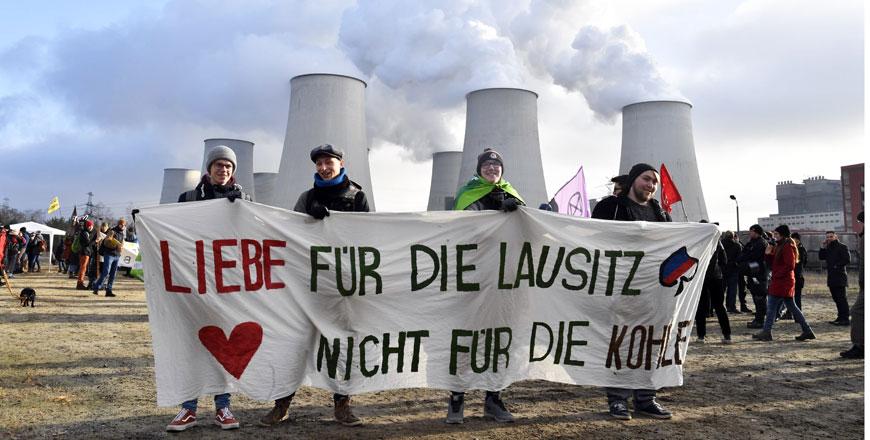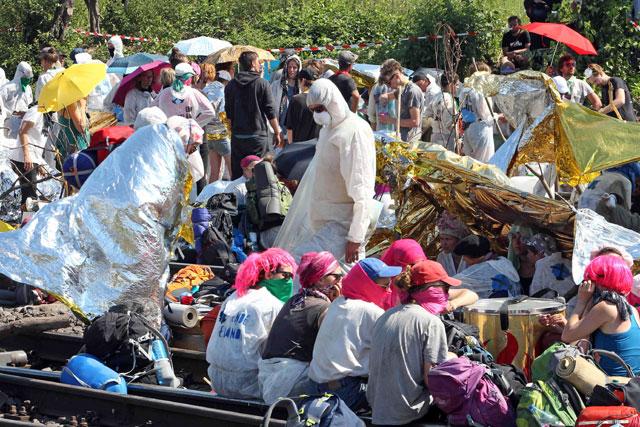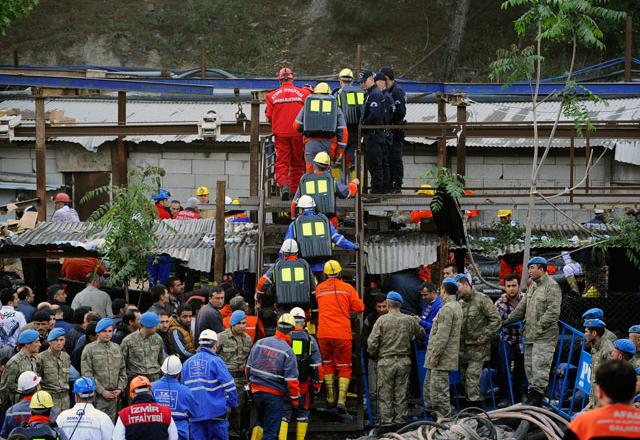You are here
Campaigners occupy German coal mines in climate protest
By AFP - Nov 30,2019 - Last updated at Nov 30,2019

Climate activists hold a placard reading ‘Love for Lausitz, not for the coal’ during a demonstration in front of the Jaenschwalde power plant in eastern Germany on Saturday (AFP photo)
SPREMBERG, Germany — Thousands of activists sought on Saturday to occupy several opencast coal mines in eastern Germany, to put pressure on the government to phase out the fossil fuel — a divisive issue in the country's rust belt.
With painted faces and dressed in white, hundreds of campaigners sought to force their way into a mine by Welzow-Sued — in the Lausitz basin.
Further north-east, another few hundred also arrived at Jaenschwalde Ost mine in the morning, seeking to run into the mine while another 450 blocked a railway connected to the site.
Meanwhile, MIBRAG which operates another mine — the Vereinigtes Schleenhain site — south of Leipzig also said about 1,200 protesters blocked a coal-excavator, forcing the group to halt operations.
"We have nothing against peaceful protests and the exercise of democratic rights, but we reject all forms of breach of laws and violence," MIBRAG Chairman Armin Eichholz said in a statement.
In these mining regions, thousands of jobs depend on coal. But some residents are also threatened with the loss of their homes over a planned expansion of mining.
Separately, dozens of pro-coal militants also gathered close to the Welzow mine.
"Ende Gelaende wants to destroy our infrastructures, it's not the right way to do it... we need coal in the region," Thomas Hauke, 62, told AFP, referring to the anti-coal group which is organising the protest.
Lost year
All three mines hit on Saturday produce lignite, a low-grade type of brown coal that is also considered the most harmful to human health and the environment.
Calling Saturday's coordinated protest action a success, a spokeswoman Ende Gelaende (Game Over) said around 3,000 turned up for the blockades.
"Despite all the nice speeches and promises, 2019 was another lost year for the climate," said Nike Malhaus.
The occupation is being supported by other environmental groups, including the German branch of Fridays for Future which is also holding a protest at a power station in the region.
It will be the second time this year that Ende Gelaende has occupied a coal mine. In June, several hundred climate activists carrying sleeping bags blocked the vast Garzweiler lignite mine near Cologne for several days.
Campaigners say the government's plans to phase out coal by 2038 announced this year do not go far enough.
They want that date brought forward for Germany to meet its international commitments to slash carbon pollution.
"The plan is totally empty. It's a scandal, a crime against future generations," Malhaus said this week.
Far-right surge
The mining industry in the Lausitz basin, which stretches all the way into Poland, is vital to the local economy.
Czech-controlled LEAG, which owns the Jaenschwalde and Welzow-Sued mines, is one of the region's largest employers with 8,000 workers.
Opposition to the government's plants to shut down coal mines was seen as a factor behind a surge for the far-right AfD Party in regional elections in September.
The AfD is now second after the centre-left Social Democrats in the Brandenburg region where the Lausitz mines are located.
The local council in Cottbus, a city a few kilometres from the Lausitz basin, passed a motion condemning the occupation with the support of all parties except the Greens.
Malhaus admitted there was "a climate of defiance towards our movement on the local level".
But she also pointed to local support in the Lausitz.
"We have a lot of campaigners here so it's not true to say that all inhabitants of this region are in favour of coal," she said.
LEAG has also faced strong opposition to its plans to expand lignite mining in the region, which would result in the resettlement of two villages.
Germany's decision in 2011 to abandon nuclear power following the Fukushima disaster in Japan has made the country more dependent on coal as renewables struggle to fill the gap.
Related Articles
BERLIN — German energy giant RWE said on Sunday it will be seeking prosecutions after hundreds of climate activists occupied their open-cast
LÜTZERATH, Germany — After the last farmer packed up and left in October, climate activists are the only people left in the village of
Rescuers battled Wednesday to reach hundreds of workers feared trapped after an explosion at a mine in western Turkey that has killed at least 205 people in one of the worst industrial disasters ever to hit the country.


















